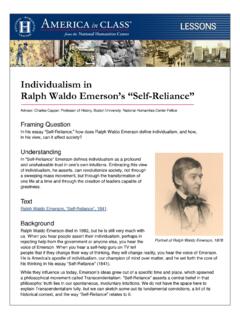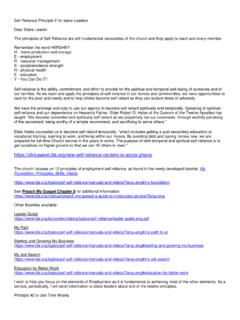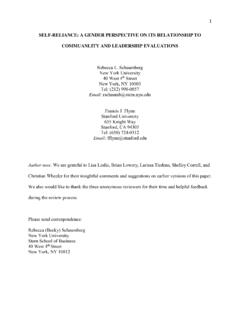Transcription of Self Reliance - BYU Speeches
1 Thank you for that beautiful music. Some-one said, This is the luxury of beautiful music. We love it for what it makes us forget, but most of all we love it for what it makes us remember. That beautiful rendition has reminded me of Him whose servants we are and whose children we are, and it has given me some sustaining influence on this Sabbath evening. I think I should alert you to the fact that the talk I have prepared is not really very interest-ing. That, I must claim, is not because I have not spent time in preparing it, for I have a good deal more than usual.
2 I want very much to be informative, and if you find that the talk is not interesting, and you may, be patient with the thought that in this case I would rather teach a few of you than entertain all of you. For a long time I have had a subject on my mind that I have wanted to discuss with the young adults of the church. I have set it aside time after time because it is very difficult to explain. although the subject is very com-monplace, I have never heard anyone else talk about it. Before I m through, perhaps some of you may be like the student who attended a lecture and then wrote:I don t like the teacher.
3 The subject s too d cut this class, but I need the , if you find yourself in that situation, and you may, be my guest. But no snoring please. We ll try to awaken you somewhere near the self - Reliance and Church Welfare There s a principle of education known as transfer, and I should like to make use of it by talking about a familiar program of the church and then transferring the fundamental princi-ple of it to anther part of our lives. First, let me review for you some of the basic principles of the church welfare program.
4 Church welfare, however, is not the subject of my sermon. I m only going to use it to illustrate a point. The church was two years old when the Lord revealed that the idler shall not have place in the church, except he repent and mend his ways (d&c 75:29). President INTeLLecTuaL reServe, INc. 1 self RelianceBoyd K. PacKerBoyd K. Packer was a member of the Quorum of the Twelve Apostles of The Church of Jesus Christ of Latter-day Saints when this fireside address was given at Brigham Young University on 2 March Brigham Young University 1975 SpeechesMarion G.
5 Romney in our last conference explained this principle with his characteristic simple directness: The obligation to sustain one s self was divinely imposed upon the human race at its beginning. In the sweat of thy face shalt thou eat bread, till thou return unto the ground. (Genesis 3:19). The welfare handbook instructs, [We must] earnestly teach and urge members to be self -sustaining to the fullest extent of their power. No Latter-day Saint will .. voluntarily shift from himself the burden of his own support.
6 So long as he can, under the inspiration of the almighty and with his own labors, he will sup-ply himself with the necessities of life (1952, p. 2). We have succeeded fairly well in establish-ing in the minds of Latter-day Saints that they should take care of their own material needs and then contribute to the welfare of those that cannot provide the necessities of life. If a member is unable to sustain himself, then he is to call upon his own family, and then upon the church, in that order, and not upon the government at all.
7 We have counseled bishops and stake presidents to be very careful to avoid abuses in the welfare program. When people are able but are unwilling to take care of themselves, we are responsible to employ the dictum of the Lord, that the idler shall not eat the bread of the laborer. The simple rule has been, to the fullest extent possible, to take care of one s self . This couplet of truth has been something of a model: eat it up, wear it out, make it do, or do without. It s not an unkind or an unfeeling bishop who requires a member of the church to work to the fullest extent he can for what he receives from church welfare.
8 It is not a quick handout system merely for the asking. It requires a care-ful inventory of all personal resources, all of which must be committed before anything is added from the outside. There should not be the slightest embarrassment on the part of any member of the church to be assisted by the church welfare program provided, that is, that he has contributed all that he can contrib-ute. every personal resource of his own must be called upon first. Some of you are struggling to get through school and you re suffering from some financial pressure, perhaps even some deprivation for a season while you re preparing so that you can be self -sustaining all the rest of your lives.
9 If you re in need, it is quite in order for you to turn first to your family, and then to the church. Because of the probability that some may join the church for the material security they think they will find here, missionaries are counseled not to emphasize the church wel-fare program in their proselyting. I met an investigator once in New Hampshire who was joining the church for just that reason. He told me how impressed he was with the welfare program and how much he wanted that secu-rity.
10 I told him, yes, by all means, if you know about the welfare program, join the church for that reason. We need all of the help we can get, and you shall be called upon continually to contribute to the welfare of others. His enthu-siasm for baptism faded immediately. When the church welfare program was first announced in 1936, the First Presidency made this statement:Our primary purpose was to set up, insofar as possible, a system under which the curse of idle-ness would be done away with, the evils of the dole abolished, and independence, industry, thrift, and self -respect be once more established amongst our people.















